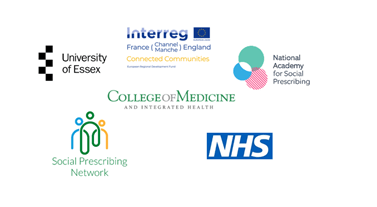
The team's systematic review of existing evidence showed social prescribing is a useful tool to address loneliness, but more research needs to be done with a more consistent approach to gathering evidence.
The team co-organised the 4th International Annual Social Prescribing Conference in conjunction with The National Academy for Social Prescribing, The College of Medicine and Integrated Health, and NHS England and NHS Improvement, Personalised Care Group. The event was generously funded through the Interreg’s European Regional Development Fund who fund the Connected Communities project.
The conference was an opportunity for social prescribing professionals to share ideas and ways of working in this fast-growing public health movement. The conference coincided with National Prescribing Day and Sir Michael Marmot, from the Institute of Health Inequalities, used his keynote address to describe how social prescribing can be used to address existing social and health inequalities.
Academics from the University of Essex’s Department of Government, Professor Gina Yannitell Reinhardt and Dr Dragana Vidovic presented their work on evaluating social prescribing programmes such as Connected Communities while showcasing social prescribing in the East of England. In the breakout sessions, participants had the opportunity to meet the Connected Communities team to discuss how they could work together to measure and evaluate the impact of social prescribing initiatives.
Professor Gina Yannitell Reinhardt who leads the Connected Communities team, said: “This conference was an exciting opportunity to show how people in our region are being supported by social prescribing, and to meet people around the world who want to learn more about how to evaluate its impact. Feedback from the delegates indicated that they valued meeting people from a range of employment backgrounds and academic disciplines. We look forward to collaborating with the professionals we met, and hope that together we can advance the state of impact evaluation.”
The team also spoke at the East of England Regional Social Prescribing Conference where they were able share the research findings from their published paper, Understanding Loneliness: a Systematic Review of the Impact of Social Prescribing Initiatives on Loneliness (2021).
Dr Dragana Vidovic, Senior Researcher on the Connected Communities project said: “Our research paper outlines how social prescribing impacts have previously been measured within academic research. We looked at how to evaluate social prescribing and its impact on wellbeing, loneliness, social isolation and connectedness. Our findings suggested that improvements can be made through greater conceptual clarity and implementing a range of evaluation measures.
“Social prescribing is the fastest growing public health movement – from social movement to national policy in 3 years. To participate in both events and hear reflections by the local social prescribing providers, voluntary, community and enterprise sector, local authority and research sector representatives was beyond inspiring and humbling. At the centre of this success is effective relationship building. In order to deliver social prescribing, in some cases, more than 60-70 organisations come together. This is a fascinating movement with great momentum. I am keen to follow and support it in the years to come!”
If you are interested in finding out more about the team’s work, please contact the team: nw22563@essex.ac.uk or tweet us @connectcommune


.jpg?mh=500&mw=500&hash=6568B6C9CCF5290A596BEF6678B6AD0E)



